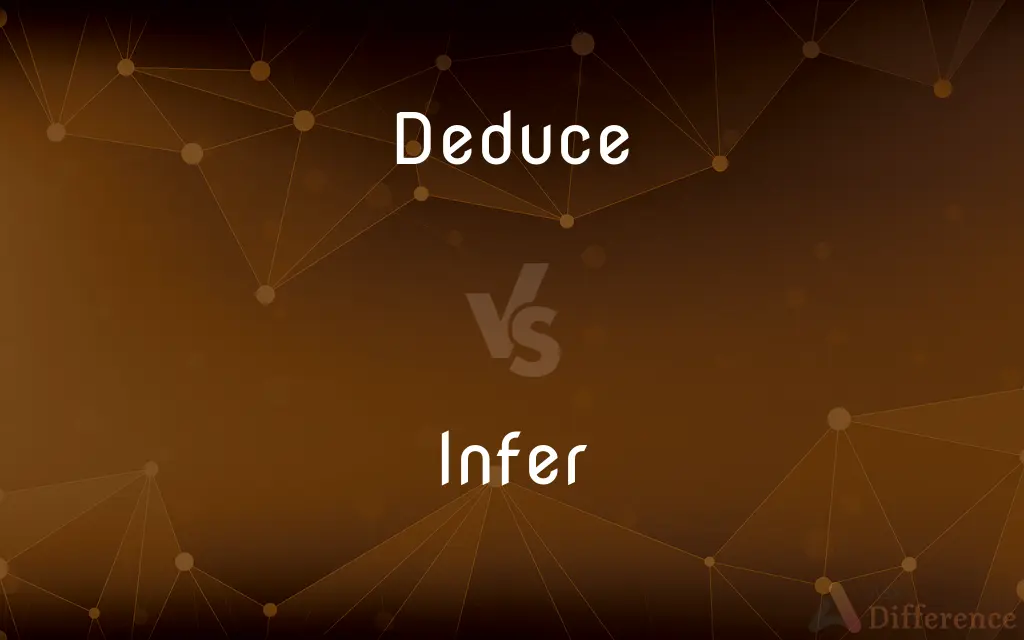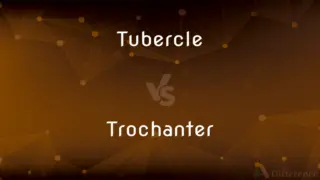Deduce vs. Infer — What's the Difference?
By Tayyaba Rehman — Updated on November 2, 2023
"Deduce" means to derive a conclusion from known facts or principles, while "Infer" means to draw a conclusion based on evidence or reasoning. Both relate to conclusions but use different methods.

Difference Between Deduce and Infer
Table of Contents
ADVERTISEMENT
Key Differences
Deduce typically involves starting with a general statement or principle and determining something specific from it. Infer, on the other hand, often starts with specifics and makes a broader generalization.
When one deduces, they use logical reasoning to arrive at a conclusion that's certain given the premises. In contrast, to infer is to make a reasonable guess or assumption based on available evidence, which might not be certain.
While both deducing and inferring are processes of drawing conclusions, deducing is more about following a logical pathway from a general rule, whereas inferring is about making educated guesses based on observations.
A detective might deduce that a crime had a particular motive because of established rules of human behavior. The same detective might infer a suspect's guilt based on the evidence at a crime scene.
In essence, to deduce is to conclude by reasoning from general to specific, and to infer is to conclude by reasoning from specific evidence to a broader generalization.
ADVERTISEMENT
Comparison Chart
Basis
General principle or rule
Specific evidence or observations
Certainty
Conclusions are often certain
Conclusions might be probable but not certain
Direction
From general to specific
From specific to general
Example Context
Mathematical proofs
Interpretation of a novel's theme based on its text
Nature
Logical reasoning
Educated guess based on evidence
Compare with Definitions
Deduce
To determine by reasoning or deduction; deduce from evidence.
She deduced that he was lying from his contradictory statements.
Infer
To draw a conclusion based on facts, evidence, or reasoning.
The data allowed scientists to infer a rise in temperature.
Deduce
To infer details or specifics from a general principle.
Given the laws of physics, he deduced the outcome of the experiment.
Infer
To derive as a conclusion from facts or premises.
We inferred his expertise by observing his work.
Deduce
To reason from general principles to a specific instance.
He deduced the answer by applying the mathematical theorem.
Infer
To guess; surmise.
He inferred the motive behind her actions.
Deduce
To reach (a conclusion) by reasoning.
Infer
To conclude from evidence or by reasoning
"For many years the cerebral localization of all higher cognitive processes could be inferred only from the effects of brain injuries on the people who survived them" (Sally E. Shaywitz).
Deduce
To infer from a general principle; reason deductively
Deduced from the laws of physics that the new airplane would fly.
Infer
To involve by logical necessity; entail
"Socrates argued that a statue inferred the existence of a sculptor" (Academy).
Deduce
To trace the origin or derivation of.
Infer
(Usage Problem) To indicate indirectly; imply.
Deduce
(transitive) To reach (a conclusion) by applying rules of logic or other forms of reasoning to given premises or known facts.
Infer
To draw inferences.
Deduce
(transitive) To examine, explain, or record (something) in an orderly manner.
Infer
(transitive) To introduce (something) as a reasoned conclusion; to conclude by reasoning or deduction, as from premises or evidence.
Deduce
To obtain (something) from some source; to derive.
Infer
To lead to (something) as a consequence; to imply.
Deduce
To be derived or obtained from some source.
Infer
(obsolete) To cause, inflict (something) upon or to someone.
Deduce
To take away (something); to deduct, to subtract (something).
To deduce a part from the whole
Infer
(obsolete) To introduce (a subject) in speaking, writing etc.; to bring in, to adduce.
Deduce
To lead (something) forth.
Infer
To bring on; to induce; to occasion.
Deduce
To lead forth.
He should hither deduce a colony.
Infer
To offer, as violence.
Deduce
To take away; to deduct; to subtract; as, to deduce a part from the whole.
Infer
To bring forward, or employ as an argument; to adduce; to allege; to offer.
Full well hath Clifford played the orator,Inferring arguments of mighty force.
Deduce
To derive or draw; to derive by logical process; to obtain or arrive at as the result of reasoning; to gather, as a truth or opinion, from what precedes or from premises; to infer; - with from or out of.
O goddess, say, shall I deduce my rhymesFrom the dire nation in its early times?
Reasoning is nothing but the faculty of deducing unknown truths from principles already known.
See what regard will be paid to the pedigree which deduces your descent from kings and conquerors.
Infer
To derive by deduction or by induction; to conclude or surmise from facts or premises; to accept or derive, as a consequence, conclusion, or probability; as, I inferred his determination from his silence.
To infer is nothing but by virtue of one proposition laid down as true, to draw in another as true.
Such opportunities always infer obligations.
Deduce
Reason by deduction; establish by deduction
Infer
To show; to manifest; to prove.
The first part is not the proof of the second, but rather contrariwise, the second inferreth well the first.
This doth infer the zeal I had to see him.
Deduce
Conclude by reasoning; in logic
Infer
Reason by deduction; establish by deduction
Deduce
To derive as a conclusion from something known or assumed.
From the clues, she deduced the thief's identity.
Infer
Draw from specific cases for more general cases
Infer
Conclude by reasoning; in logic
Infer
Guess correctly; solve by guessing;
He guessed the right number of beans in the jar and won the prize
Infer
Believe to be the case;
I understand you have no previous experience?
Infer
To deduce or conclude information from evidence and reasoning.
From his smile, she inferred that he was happy.
Infer
To hint or suggest.
Her tone inferred that she was upset.
Common Curiosities
In which context is "Deduce" commonly used?
It's often used in contexts like mathematical proofs or logical reasoning.
How is "Infer" different from "Deduce"?
"Infer" involves making an educated guess based on evidence, while "Deduce" involves logical reasoning from general to specific.
Can "Infer" mean to hint or suggest?
Yes, "Infer" can also mean to hint or indirectly suggest something.
Is deducing a top-down process?
Yes, deducing typically moves from a general principle to a specific conclusion.
Is a deduction always certain?
Deductions, when based on true premises, often lead to certain conclusions.
Can an inference be uncertain?
Yes, inferences are often probable based on evidence but not always certain.
Is inferring a bottom-up process?
Yes, inferring often moves from specific evidence to a broader generalization.
Can a conclusion reached by deduction be incorrect?
If the premises are true and the reasoning is valid, deductions are correct. But false premises can lead to incorrect conclusions.
Can "Infer" be used in literary analysis?
Yes, readers often infer themes or motives based on text evidence.
What does "Deduce" mean?
"Deduce" means to derive a conclusion from known facts or principles.
Are inferences always based on observations?
Often, but not always. They are based on evidence or reasoning, which can include observations.
Is "Deduce" more about certainty than "Infer"?
Generally, yes. Deductions offer more certainty, while inferences may involve probability.
Do scientists often use "Infer"?
Yes, scientists make inferences based on experimental data or observations.
Is the term "Deduce" common in detective work?
Yes, detectives deduce conclusions based on known facts or established principles.
Share Your Discovery

Previous Comparison
Tubercle vs. Trochanter
Next Comparison
Pierogi vs. PirozhkiAuthor Spotlight
Written by
Tayyaba RehmanTayyaba Rehman is a distinguished writer, currently serving as a primary contributor to askdifference.com. As a researcher in semantics and etymology, Tayyaba's passion for the complexity of languages and their distinctions has found a perfect home on the platform. Tayyaba delves into the intricacies of language, distinguishing between commonly confused words and phrases, thereby providing clarity for readers worldwide.















































